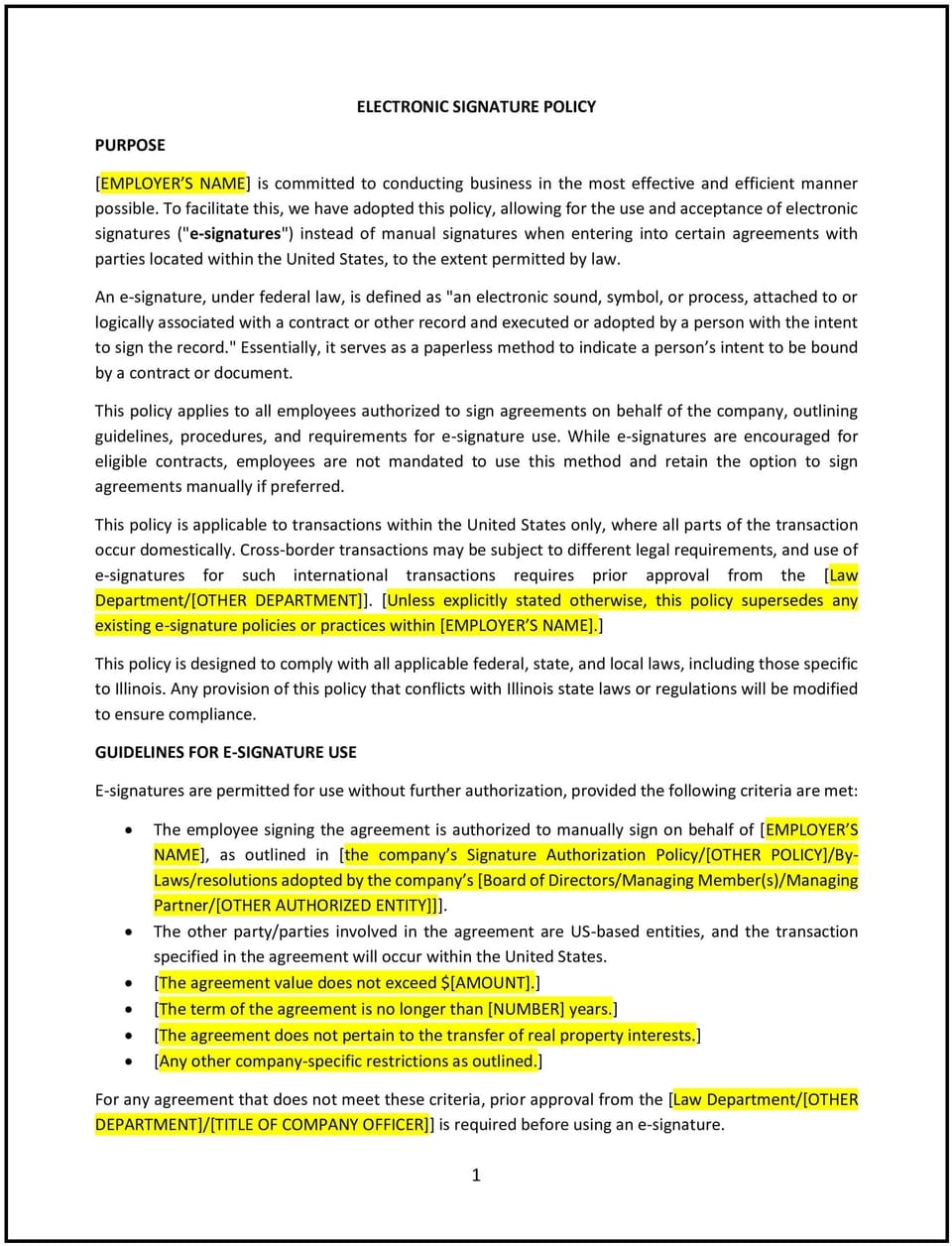Electronic signature policy (Illinois): Free template

Electronic signature policy (Illinois)
This electronic signature policy is designed to help Illinois businesses manage the use of electronic signatures for legally binding agreements. It provides guidelines for their implementation, use, and security to ensure compliance with the Illinois Electronic Commerce Security Act (ECSA) and other applicable regulations.
By adopting this policy, businesses can streamline processes, enhance efficiency, and maintain compliance with Illinois law.
How to use this electronic signature policy (Illinois)
- Define electronic signatures: Clarify what constitutes an electronic signature under this policy, such as typed names, digital signatures, or scanned handwritten signatures.
- Establish acceptable uses: Specify the types of documents and transactions where electronic signatures are permitted, such as contracts, agreements, or internal approvals.
- Outline approval processes: Detail how electronic signatures should be applied, verified, and recorded to ensure authenticity and integrity.
- Ensure compliance: Align the policy with the Illinois ECSA and federal laws like the ESIGN Act and UETA, ensuring electronic signatures are legally binding.
- Include security measures: Require secure platforms, encryption, and authentication methods to protect electronically signed documents.
- Address storage requirements: Specify how electronically signed documents should be stored, including retention periods and accessibility standards.
- Provide exceptions: Identify any documents or transactions that may not be eligible for electronic signatures, such as wills or certain real estate agreements, as restricted by Illinois law.
- Monitor compliance: Regularly review electronic signature practices to ensure adherence to this policy and Illinois legal standards.
Benefits of using this electronic signature policy (Illinois)
This policy provides several benefits for Illinois businesses:
- Enhances efficiency: Streamlines approval processes and reduces paperwork through the use of electronic signatures.
- Promotes compliance: Aligns with Illinois ECSA and federal laws, ensuring electronic signatures are legally valid.
- Improves security: Establishes robust measures to protect electronically signed documents from unauthorized access or tampering.
- Reduces costs: Minimizes printing, mailing, and storage expenses associated with physical documents.
- Supports sustainability: Encourages paperless practices, reducing environmental impact.
Tips for using this electronic signature policy (Illinois)
- Communicate the policy: Share the policy with employees and ensure it is included in onboarding materials and employee handbooks.
- Use secure platforms: Implement trusted electronic signature platforms with encryption and authentication features.
- Train employees: Provide training on the proper use of electronic signatures and the importance of document security.
- Monitor usage: Regularly audit electronic signature practices to ensure compliance and identify areas for improvement.
- Update regularly: Revise the policy to reflect changes in Illinois laws, technology, or business practices.
Q: What is considered an electronic signature under this policy?
A: An electronic signature can include typed names, digital signatures, or scanned handwritten signatures used to signify agreement.
Q: Are electronic signatures legally binding in Illinois?
A: Yes, electronic signatures are legally binding under the Illinois Electronic Commerce Security Act and federal laws like the ESIGN Act.
Q: What types of documents can be signed electronically?
A: Electronic signatures can be used for contracts, agreements, internal approvals, and other documents permitted by Illinois law.
Q: How are electronically signed documents secured?
A: Documents are protected through encryption, authentication methods, and secure storage platforms to ensure their integrity and confidentiality.
Q: Can electronic signatures be used for all transactions?
A: No, certain documents, such as wills or specific real estate transactions, may not be eligible for electronic signatures under Illinois law.
Q: How are electronically signed documents stored?
A: Documents must be stored securely, with retention periods and accessibility standards outlined in this policy.
Q: How often is this policy reviewed?
A: This policy is reviewed annually or whenever significant changes occur in Illinois laws, technology, or business practices.
Q: What should employees do if they suspect unauthorized use of electronic signatures?
A: Employees should report suspected unauthorized use to their manager or the designated compliance officer immediately.
This article contains general legal information and does not contain legal advice. Cobrief is not a law firm or a substitute for an attorney or law firm. The law is complex and changes often. For legal advice, please ask a lawyer.


